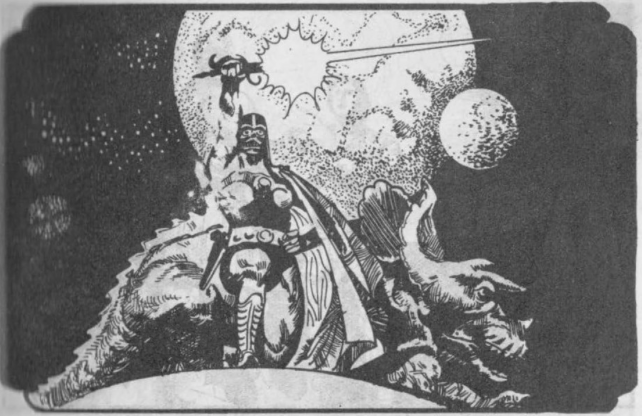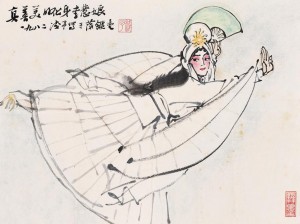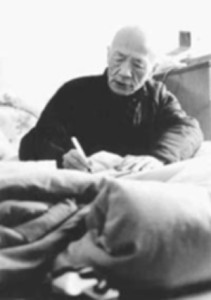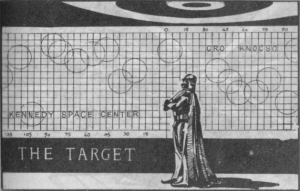 Well, the Star Wars comic has proved shockingly popular; I’ve been keeping up on both where it’s going & the sorts of discussions its been stimulating with great interest. I’ve actually been pleasantly surprised that there’s been a lot of delight (and trying to figure out where the references are coming from), versus generalized grousing about shanzhai culture in China; the timbre of the discussion also seems a bit different from the usual ‘point and laugh at bizarre Chinese shanzhai whatever.’
Well, the Star Wars comic has proved shockingly popular; I’ve been keeping up on both where it’s going & the sorts of discussions its been stimulating with great interest. I’ve actually been pleasantly surprised that there’s been a lot of delight (and trying to figure out where the references are coming from), versus generalized grousing about shanzhai culture in China; the timbre of the discussion also seems a bit different from the usual ‘point and laugh at bizarre Chinese shanzhai whatever.’
I was burbling to a colleague about its spread & he asked why I was cordoning it off from my ‘actual work’ (‘This is your actual work!’ was basically his response), but I suppose I’ve looked at it as an idle curiosity, with barely any connections to my research topic of the past few years – especially with some of the grandiose titles authors have come up with, discussing its rarity and my “unearthing” of it (I feel as though I unearth things from the archives; this was a cheap purchase on the fly!). Unlike Nick Stember (who has been posting translations of the comics on his site, and did a wonderful post on lianhuanhua adaptations of Western movies), say, or any number of other academics, I don’t primarily study visual culture. I certainly don’t deal with interpretations of Western culture in the PRC (at least, not of this sort) – Li Huiniang (a lot of the great ghost operas, really) is about as classically Chinese, in form, language, and content, as one is going to get.
But a comment on the Star Wars post got me thinking. The comment noted:
So this is a story of a rebel faction (written as é€ å者, no less) fighting against the tyranny of a great empire, and it was just so casually published in China back then? I find this rather interesting.
In contrast, a translated Japanese light novel “No Game No Life” was recently banned in China, because the protagonists won a (modified) chess game by inciting a coup in the opponent’s (chess-piece) camp, and the book was deemed to promote subversion, blah blah blah,
Actually, I find this very unsurprising; of all the things that have crossed my mind, the “rebel faction fighting great empire” being problematic was not one. Perhaps if Star Wars had premiered in 1963; but 1980? The post-Cultural Revolution “thaw” of the very late 1970s/early 1980s looks remarkably like the post-Great Leap Forward thaw of the early 1960s. My research concerns opera in particular, but the relative relaxation of both periods was seen elsewhere, and for very similar reasons (and, I would guess, opera was generally considered more of a bureaucratic priority than lianhuanhua: regulation would have been stiffer for opera). The present, of course, is a different kettle of fish altogether; who knows what would be said about this presentation of Star Wars right now?
The Star Wars comic may seem a strange thing to try and compare to traditional Chinese opera (xiqu æˆæ›²), but consider the fact that (quoting from my Appendix piece on Li Huiniang through the ages) there is a very beloved plot structure in Chinese theatre, going something like this:
It is a time of great crisis for China, a period when peasants break under the strain of government pressure and foreign armies agitate on the borders. A cruel or impressively incompetent ruler is in power, a person who cares for little but his own pleasure. At best, he ignores pressing political issues and the unhappiness of his people; at worst, he makes the lives of the people worse through draconian punishments and inhuman land requisitions and taxation. Weak and corrupt lackeys and subordinates surround him. But there is somebody—there is always at least one person—who finally stands up to him. It may be an official with a sharply honed sense of right and wrong, or perhaps a gutsy young scholar who burns with righteous fury. And sometimes there is an innocent bystander who meets a gruesome, unjust end.
Little guy against the big guy (even in Hai Rui Dismissed from Office [Hai Rui baguan 海瑞罢官] – by Wu Han å´æ™— – you’re dealing with an important minister versus an even more important person – the emperor); the big guy is invariably doing something wrong (usually really, really wrong). In the case of Li Huiniang æŽæ…§å¨˜, one of the ghost plays I study most intensely, it’s a combination of gutsy young scholar & a powerless concubine. The scholar stands up for himself in the face of the evil prime minister (who is cavorting by West Lake while the peasants starve and barbarians mass on the northern borders: callous and incompetent), the concubine remarks admiringly on it, and she winds up dead at the hands of the prime minister (and returns as an incredibly righteously indignant ghost, at least in the version by Meng Chao åŸè¶…).
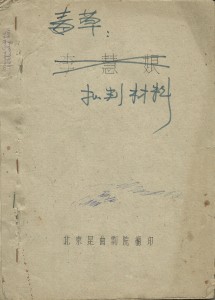
Li Huiniang script used by the Beijing Kunqu Troupe, marked “poisonous weed” above the crossed out title – below is noted that it is “evidence for criticism.” From my personal collection.
Until 1963 – and, for plays like Hai Rui, until 1965 – these sorts of story lines weren’t read as subversive, at least not in official channels. They were celebrated for encouraging a “resisting spirit,” “spirit of revolt” [fankang jingshen å抗精神] in their audiences; naturally, they were not talking about the spirit of resisting the Party, but of everything else that needed to be resisted (America, capitalism, revisionism, landlords, Confucianism, the patriarchy, whatever: the list is practically endless). Some of this is simply part and parcel of the game of Marxist showmanship, where intellectuals and artists trotted through a pretty standard set of narratives to justify why certain types of culture – often the things Mao had said (at Yan’an) ought to be “totally destroyed” – were perfectly appropriate for socialist China. On the other hand, I’m not keen to dismiss all of that kind of talk as meaningless: I think there was a kernel of truth underneath all those claims (that is, I think a lot of the writers did believe in the power of art, and did think it could be “educational” without being over the top, and did think “the masses” probably had something to learn from watching well-loved classics).
However, there was undoubtedly an element of modern “indirect remonstrance” regarding the Great Leap Forward by senior intellectuals who were writing these revamped classical tales. But that (like the story lines themselves) is a grand tradition. Tian Han 田汉, the famous playwright who also write a revised historical drama along the same lines (Xie Yaohuan 谢瑶环), supposedly told Meng Chao that Li Huiniang‘s great fault was that opera (qÇ” 曲) should be “bent” or “indirect” (qÅ« 曲); Li Huiniang was too “unyielding,” or “not bent,” or “direct” (buqÅ« ä¸æ›²).1 As it turned out, they were considered “too direct” – an attack on the Party, or on Mao himself – after 1963; Li Huiniang, Xie Yaohuan, Hai Rui, and their authors were savaged in the early days of the Cultural Revolution, the first casualties of that long decade. I’ve written about all of this in my Modern Chinese Literature & Culture article, “A Ghostly Bodhisattva and the Price of Vengeance: Meng Chao, Li Huiniang, and the Politics of Drama, 1959-1979.”
But the terror of the Cultural Revolution was not foreordained in 1961, and it was a period of relative relaxation, insofar as parts of the cultural realm were concerned. Who could have seen 1966 coming when Chen Yi 陈毅 (at the time the Foreign Minister) commented on the profusion of crappy, didactic dramas that flourished during the Great Leap Forward: “Plays,” he said, “should give us pleasure and artistic satisfaction, not a political lesson.” The reasoning was, of course, that having come through such a dreadful period, people just needed to be entertained; to smile and be happy; to forget. Zhang Zhen å¼ çœŸ, a staunch defender of traditional drama throughout the 1950s and early 1960s, wrote in 1956 on the overzealous application of certain rules regarding drama (in this case, the dictate that the masses should not be made the butt of jokes):
… the clowns have all washed their faces clean [referring to the traditional makeup style of clown characters] …. This is most odd. Can it
be that there are people who believe that the construction of socialism and laughing are incompatible? Some people think these little comedies have no didactic purpose, but I think in regards to [them], we should just want them to give the audience a healthy laugh, and this is enough.
The tension between didactic drama and artistically valuable drama (or just entertaining drama) is felt throughout the period. But in the short thaw of the early 1960s, although playwrights and intellectuals didn’t back away totally from the need to justify their work on socialist merits, they weren’t tied to producing works of often questionable creative and artistic standards (indeed, the performance of contemporary-themed revolutionary works – never terribly robust – drops to practically nil in the period between 1960 and 1964).
In any case, the Cultural Revolution didn’t kill these plays (their authors were another matter entirely); in the period following Mao’s death and the fall of Jiang Qing’s clique, known as the Gang of Four, in 1976, drama journals resumed publication, photographs of ballerinas with bayonets and opera singers dressed in the dull olives and blues of military uniforms were replaced (gradually) with those of plays that hadn’t seen a stage for a decade or more – actors in beautifully embroidered robes, actresses resplendent in glittering headdresses. Li Huiniang returned in 1979, one audience member recalling that when the curtain went up on the first performance in Beijing, the audience’s nervous, excited energy was palpable.
Part of this was due to the political situation, no doubt – a sign that other, more recent specters of the past were at least locked in jail – but it’s also a testament to two things: one, the enduring power of these types of classical tales (and their incredible adaptability); two, to a much more relaxed atmosphere of cultural production, one that hadn’t been seen since the early 1960s (again, this is all relative).
So, in a climate that was downright encouraging of plays like Hai Rui and Xie Yaohuan and Li Huiniang – not just plays that could be read as subversive, but had been actively criticized as attacking Mao and the Party (it’s probably a testament to how neutered traditional drama has become that it’s now pretty much in the camp of “safe and glorious national product,” ghosts or no ghosts) – plays that celebrated the long odds of the little guy versus overwhelming (usually state) power, Star Wars would’ve fit right in. Sure, it was American in origin, but it’s not like it was set in America – it’s science fiction (frankly, I’d think this less dangerous in many respects than classical Chinese tales set in China – never mind classical Chinese tales set in China that have already been accused of trying to bring down the Party). So many of the Cold War-era, space racey elements “could have” been read as us (China, the little guy!) versus them (American capitalists! The Soviet Union!) – without venturing into us (the masses) versus them (the CCP). Even more topically, it could be read as us (the masses) versus them (the Gang of Four & the excesses of the Cultural Revolution).
Besides, there were much more vicious critiques that were allowed to be published. One of my favorite essays is one I’ve written about – “I think of Meng Chao” 我怀åŸè¶… by Lou Shiyi 楼适夷 – published in 1979, where he says (in a not terribly subtle, extraordinarily sarcastic manner – and this was published in People’s Daily!) of the period of early Li Huiniang criticism:
At the time I didn’t really understand & how could “anti-Jia Sidao” count as “anti-party”? Don’t tell me our great, righteous, glorious, and honorable party was harboring a Jia Sidao?2
A fantastical space opera tale, no matter what kind of resistance it was encouraging, looks pretty tame in comparison to some of the cutting remarks of senior CCP members who had been through the gamut & had had it. So I suspect it was “allowed” because, as Chen Yi & Zhang Zhen discussed drama in the ’50s and ’60s, it could entertain people, and the people desperately needed to be entertained. Further, there were much more important things to keep an eye on. Just as bureaucrats had in the wake of the Leap, attention was turned towards getting the economy and society back on track, and away from tighter control of the cultural sphere. Policing lianhuanhua must have been pretty low on the list of things to take care of.
Besides … if I were looking for rebellion-fomenting culture c. 1980, I’m pretty sure Darth Vader & a triceratops would not be tops on my list of dangerous media. I mean, really: just look at it!

